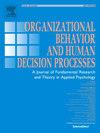长期监视不法行为是不道德性格的标志
IF 3.8
2区 管理学
Q2 MANAGEMENT
Organizational Behavior and Human Decision Processes
Pub Date : 2025-03-01
DOI:10.1016/j.obhdp.2025.104402
引用次数: 0
摘要
惩罚不法行为有时会带来声誉上的好处。但是,人们如何看待那些经常监控周围环境以寻找不法行为迹象的人呢?根据工作场所警戒主义的概念,我们假设工作场所环境中的监控行为是一个人道德品质的负面暗示。特别是,我们建议长期监测不法行为的迹象表明,个人受到报复性和竞争性平衡动机的驱动,以及将敌对动机归咎于他人的倾向。我们通过六项研究(和三项补充研究)来检验这一观点。在研究1中,我们发现员工对那些在工作中警惕地监督和谴责错误行为的人有很大的负面印象。在研究2中,我们发现,如果惩罚者的惩罚行为之前有对不当行为的长期监控,那么他们就会被视为道德水平较低。在研究3中,我们发现参与长期监控的惩罚者被视为具有更高的报复性和竞争性平衡动机。在研究4中,我们发现,即使违规行为以礼貌的方式解决,长期监控的声誉成本仍然存在,并且长期监控标志着一个人将敌对意图归咎于他人。在研究5中,我们发现了个体差异调节因子,表明当观察者具有相似的义务警员倾向时,对工作场所义务警员的负面判断会减弱。最后,在研究6中,我们发现长期监控导致的声誉成本在一系列工作场所违规行为中被观察到,包括当违规行为具有相当大的组织重要性时。总之,我们的研究结果表明,惩罚者的道德品质可能取决于是否在这种惩罚行为之前对不法行为进行监控。本文章由计算机程序翻译,如有差异,请以英文原文为准。
Chronic monitoring for wrongdoing as a signal of immoral character
Punishing wrongdoing can sometimes have reputational benefits. But what do people think of those who regularly monitor their environment for signs of wrongdoing? Drawing on the concept of workplace vigilantism, we posit that acts of monitoring in workplace settings serve as negative cues of one’s moral character. In particular, we propose that chronically monitoring for signs of wrongdoing signals that an individual is driven by retributive and competitive leveling motives as well as a tendency to ascribe hostile motives to others. We examine this idea across six studies (and three supplementary studies). In Study 1, we find that employees have largely negative impressions of individuals who vigilantly monitor and reprimand wrongdoings at work. In Study 2, we find that punishers are seen as less moral when their acts of punishment are preceded by chronic monitoring for wrongdoing. In Study 3, we find that punishers who engage in chronic monitoring are seen as possessing heightened retributive and competitive leveling motives. In Study 4, we find that the reputational costs of chronic monitoring persist even when the violation is addressed in a courteous manner and that chronic monitoring signals that one ascribes hostile intentions to others. In Study 5, we identify an individual difference moderator, showing that negative judgments of workplace vigilantes are attenuated when observers share similar vigilante tendencies. Finally, in Study 6, we find that the reputational costs that result from chronic monitoring are observed across an array of workplace violations, including when the violation is of considerable organizational importance. Together, our results demonstrate that the perceived moral character of a punisher can hinge on whether monitoring for wrongdoing precedes such punitive acts.
求助全文
通过发布文献求助,成功后即可免费获取论文全文。
去求助
来源期刊
CiteScore
8.90
自引率
4.30%
发文量
68
期刊介绍:
Organizational Behavior and Human Decision Processes publishes fundamental research in organizational behavior, organizational psychology, and human cognition, judgment, and decision-making. The journal features articles that present original empirical research, theory development, meta-analysis, and methodological advancements relevant to the substantive domains served by the journal. Topics covered by the journal include perception, cognition, judgment, attitudes, emotion, well-being, motivation, choice, and performance. We are interested in articles that investigate these topics as they pertain to individuals, dyads, groups, and other social collectives. For each topic, we place a premium on articles that make fundamental and substantial contributions to understanding psychological processes relevant to human attitudes, cognitions, and behavior in organizations. In order to be considered for publication in OBHDP a manuscript has to include the following: 1.Demonstrate an interesting behavioral/psychological phenomenon 2.Make a significant theoretical and empirical contribution to the existing literature 3.Identify and test the underlying psychological mechanism for the newly discovered behavioral/psychological phenomenon 4.Have practical implications in organizational context

 求助内容:
求助内容: 应助结果提醒方式:
应助结果提醒方式:


